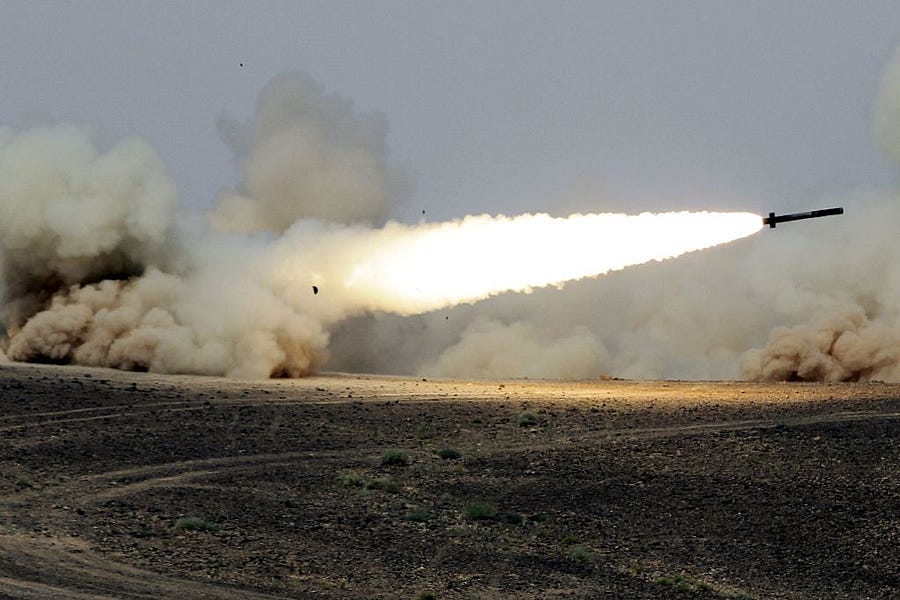The U.S. Constitution grants the power to declare war and “raise and support” an army and navy to the legislative branch, not the executive. But in recent decades, war powers have shifted more and more to the president, leaving some of the most important decisions the country’s leaders face to the White House, sometimes without consultation with members of Congress.
Even when Congress tries to reassert its war powers or legislate against a president’s decision to engage in hostilities, rarely are lawmakers able to mount a veto-proof majority in either chamber, meaning the president ultimately gets what he wants. Just look to the Trump years: As Soren Dayton of Protect Democracy points out, Congress tried to rebuke decisions by the former president several times in 2019 and 2020, but members were thwarted by a veto each time such legislation passed.
These rebukes included, among other measures, legislation to prohibit unauthorized hostilities against Iran, to end American involvement in the war in Yemen, and to block arms sales to Saudi Arabia.
As we wrote last week in Uphill, Reps. Jim McGovern and Peter Meijer, a Massachusetts Democrat and a Michigan Republican, have introduced legislation to redirect some of the war powers currently exercised by the executive branch back to Congress. Also signing on to the bipartisan bill are Democratic Reps. Peter DeFazio, Barbara Lee, Ted Lieu, and Joaquin Castro, and Republican Rep. Nancy Mace. Similar legislation was recently introduced in the Senate by Sens. Chris Murphy of Connecticut, Bernie Sanders of Vermont, and Mike Lee of Utah.
“These are not powers that Congress is writing for itself, they’re powers Congress is taking back that had been fundamentally eroded and ceded to the executive over the last several decades,” Meijer, an Iraq war veteran, told The Dispatch in an interview last week.
The National Security Reforms and Accountability Act (NSRAA) addresses three distinct areas the bill’s supporters argue are ripe for abuse by presidents: war powers, arms exports, and national emergencies.
The war powers portion focuses on limiting the president’s power to declare war and send troops to different parts of the world. For example, it shortens the termination clock under the original War Powers Resolution of 1973 from 60 days to 20 days. This deadline is the amount of time a president can conduct hostilities without congressional approval. If Congress never approves hostilities a president has already commenced, the president would be legally required to terminate the military actions in question after 20 days under McGovern and Meijer’s proposal.
Speaking of “hostilities”—that somewhat vague term is actually given a definition in this legislation. In the War Powers Resolution, the term was given no real parameters, rendering many parts of the resolution ineffective. The legislation defines hostilities as “any situation involving any continuous or intermittent use of lethal or potentially lethal force” by or against U.S. forces and, in some cases, other forces involved with the U.S. military. The definition includes hostilities carried out on “land, sea, air, space, or cyber operations, or through any other domain, including whether or not such force is deployed remotely.”
The expansive definition was designed to block the White House from using loopholes or narrow definitions to circumvent the law.
“Both bills define hostilities clearly and with enough breadth to include virtually all military actions, removing one of the ways presidents have routinely dodged congressional authorization,” Dayton, a war powers expert, wrote.
The legislation also takes aim at authorizations for the use of military force. Presidents from both parties have relied on authorizations for military force that were passed in the wake of the attacks of September 11, 2001, to conduct anti-terror wars and operations around the world for nearly two decades. Lawmakers have long debated how to replace those outdated authorizations, but disagreements over how to define geographic boundaries and which adversaries to name have hampered various bills over the years. Members of Congress have also shied away from having to take new unpopular votes on whether to send American troops to war. The war powers reform bill requires all authorizations to have clearly stated objectives and targets, and it would require a two-year expiration date—meaning lawmakers would continually have to weigh in on wars instead of dodging uncomfortable votes.
“I’m sure there are some who don’t want to cast a hard vote,” Meijer said. He added that some lawmakers would prefer for wars to be on autopilot “so that they can be blameless with however it turns out. But, that’s not how I view my role.”
The legislation would also automatically cut funding for military operations if a president does not receive proper congressional authorization.
Another goal of the legislation is to give Congress more authority over arms sales. All arms sales are currently approved automatically unless lawmakers pass a resolution with veto-proof majorities to block a given sale. This bill would flip that around, requiring Congress to approve of sales of certain weapons over a certain amount.
The bill would require authorization for sales of air-to-ground munitions, tanks, armored vehicles, fixed and rotary manned and unmanned aircraft, or services and training worth $14 million or more. It would also require approval for sales of firearms and ammunition worth $1 million or more.
The legislation would also curb presidential powers related to national emergencies. There are 39 national emergencies currently on the books. When he was in office, former President Donald Trump used national emergency powers to divert military funds to the construction of a wall along the southern border.
Lawmakers from both parties decried this use of presidential authority, but an effort to block it failed to gain enough support to override Trump’s veto.
Under the bill, Congress would have to affirmatively approve a national emergency declaration, or it would terminate in 30 days. Emergencies would also have to be renewed each year and max out after five years.
Proponents of the legislation are hoping the United States’ painful withdrawal from Afghanistan will emphasize the need for war powers reform despite lawmakers’ reluctance to address the problem.
“It’s evidently clear from what’s happened in the last few months that the apparatus is broken,” Meijer said of the coalition departure from Afghanistan. “The oversight and accountability is broken.”
If the bill’s reforms had already been in place, he said, “Frankly, I don’t think we would have arrived at where we are these last few months.”
When asked why the American people should trust a seemingly broken Congress with these powers, Meijer answered: “I am in no way shape or form sanguine on Congress acting responsibility, but I think the place where we are right now is congressional incompetence is excused, it’s accepted, and it’s given a pass.”
“That is an unsatisfactory position,” Meijer said. “The way you force somebody to improve isn’t to take more things off their plate if you think they can’t handle it. It’s to give them the responsibility that they should have, and when they fail to live up to them, hold them to account.”









Please note that we at The Dispatch hold ourselves, our work, and our commenters to a higher standard than other places on the internet. We welcome comments that foster genuine debate or discussion—including comments critical of us or our work—but responses that include ad hominem attacks on fellow Dispatch members or are intended to stoke fear and anger may be moderated.
You are currently using a limited time guest pass and do not have access to commenting. Consider subscribing to join the conversation.
With your membership, you only have the ability to comment on The Morning Dispatch articles. Consider upgrading to join the conversation everywhere.